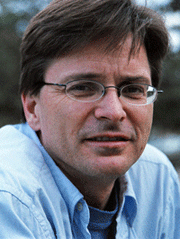The revolutions of the past
To think about a new future, we need to understand the present. To do that, I want to suggest a way of thinking about the past that highlights the three major revolutions in human history -- the agricultural, industrial, and delusional revolutions.
The agricultural revolution started about 10,000 years ago when a gathering-hunting species discovered how to cultivate plants for food. Two crucial things resulted from that, one ecological and one political. Ecologically, the invention of agriculture kicked off an intensive human assault on natural systems. By that I don’t mean that gathering-hunting humans never did damage to a local ecosystem, but only that the large-scale destruction we cope with today has its origins in agriculture, in the way humans have exhausted the energy-rich carbon of the soil, what Jackson would call the first step in the entrenchment of an extractive economy. Human agricultural practices vary from place to place but have never been sustainable over the long term. Politically, the ability to stockpile food made possible concentrations of power and resulting hierarchies that were foreign to gathering-hunting societies. Again, this is not to say that humans were not capable of doing bad things to each other prior to agriculture, but only that what we understand as large-scale institutionalized oppression has its roots in agriculture. We need not romanticize pre-agricultural life to recognize the ways in which agriculture made possible dramatically different levels of unsustainability and injustice.
The industrial revolution that began in the last half of the 18th century in Great Britain intensified the magnitude of the human assault on ecosystems and on each other. Unleashing the concentrated energy of coal, oil, and natural gas to run a machine-based world has produced unparalleled material comfort for some. Whatever one thinks of the effect of such comforts on human psychology (and, in my view, the effect has been mixed), the processes that produce the comfort are destroying the capacity of the ecosystem to sustain human life as we know it into the future, and in the present those comforts are not distributed in a fashion that is consistent with any meaningful conception of justice. In short, the way we live is in direct conflict with common sense and the ethical principles on which we claim to base our lives. How is that possible?
The delusional revolution is my term for the development of sophisticated propaganda techniques in the 20th century (especially a highly emotive, image-based advertising system) that have produced in the bulk of the population (especially in First World societies) a distinctly delusional state of being. Even those of us who try to resist it often can’t help but be drawn into parts of the delusion. As a culture, we collectively end up acting as if unsustainable systems can be sustained because we want them to be. Much of the culture’s story-telling -- particularly through the dominant story-telling institutions, the mass media -- remains committed to maintaining this delusional state. In such a culture, it becomes hard to extract oneself from that story.
So, in summary: The agricultural revolution set us on a road to destruction. The industrial revolution ramped up our speed. The delusional revolution has prevented us from coming to terms with the reality of where we are and where we are heading. That’s the bad news. The worse news is that there’s still overwhelming resistance in the dominant culture to acknowledging that these kinds of discussions are necessary. This should not be surprising because, to quote Wes Jackson, we are living as “a species out of context.” Jackson likes to remind audiences that the modern human -- animals like us, with our brain capacity -- have been on the planet about 200,000 years, which means these revolutions constitute only about 5 percent of human history. We are living today trapped by systems in which we did not evolve as a species over the long term and to which we are still struggling to adapt in the short term.
Realistically, we need to get on a new road if we want there to be a future. The old future, the road we imagined we could travel, is gone -- it is part of the delusion. Unless one accepts an irrational technological fundamentalism (the idea that we will always be able to find high-energy/advanced-technology fixes for problems),[8] there are no easy solutions to these ecological and human problems. The solutions, if there are to be any, will come through a significant shift in how we live and a dramatic down-scaling of the level at which we live. I say “if” because there is no guarantee that there are solutions. History does not owe us a chance to correct our mistakes just because we may want such a chance.
I think this argues for a joyful embrace of the truly awful place we find ourselves. That may seem counter-intuitive, perhaps even a bit psychotic. Invoking joy in response to awful circumstances? For me, this is simply to recognize who I am and where I live. I am part of that species out of context, saddled with the mistakes of human history and no small number of my own tragic errors, but still alive in the world. I am aware of my limits but eager to test them. I try to retain an intellectual humility, the awareness that I may be wrong, while knowing I must act in the world even though I can’t be certain. Whatever the case and whatever is possible, I want to be as fully alive as possible, which means struggling joyfully as part of movements that search for the road to a more just and sustainable world.
Next Page 1 | 2 | 3 | 4 | 5 | 6 | 7
(Note: You can view every article as one long page if you sign up as an Advocate Member, or higher).





